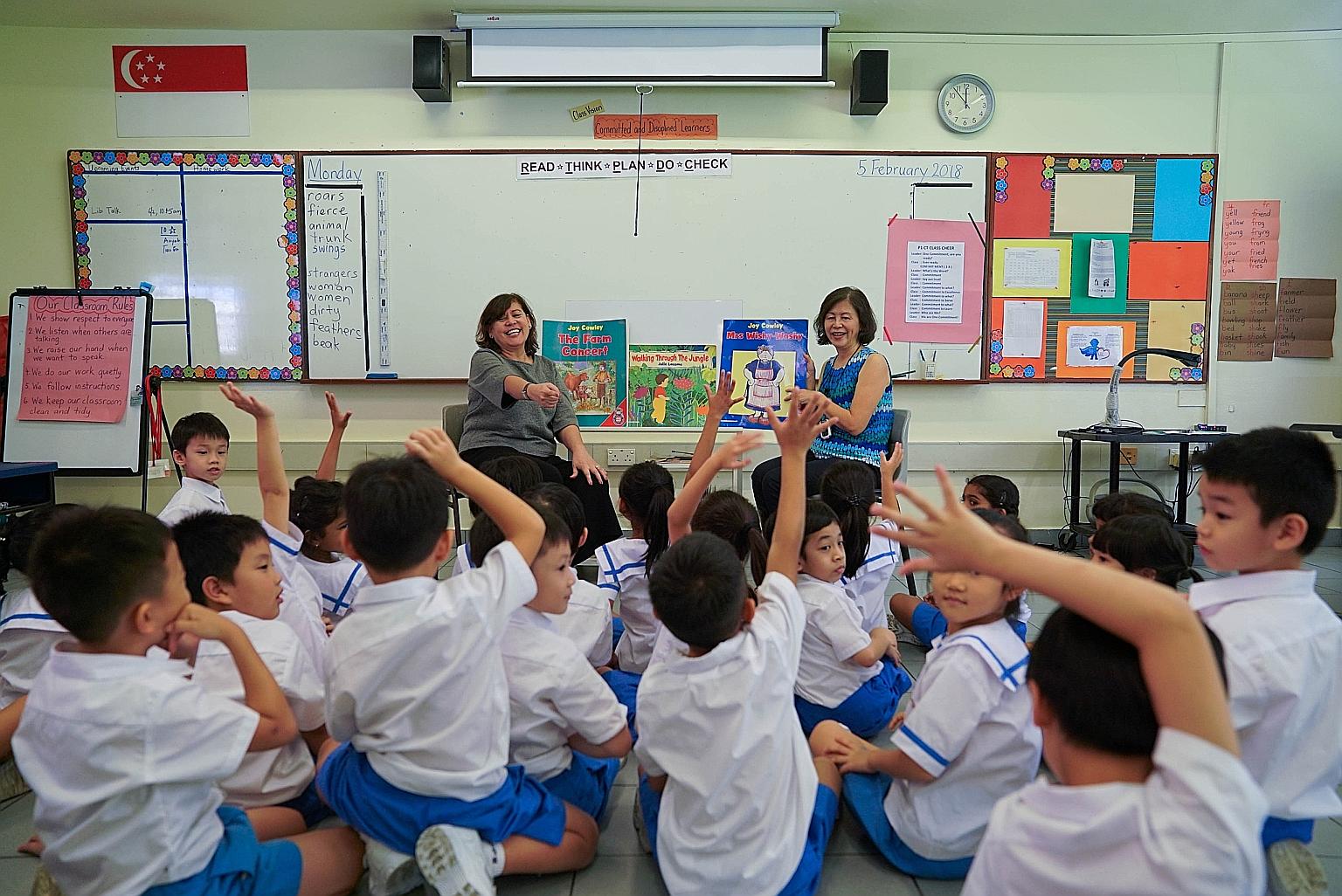Mainstream school takes in P1 kids with hearing loss
They learn alongside peers at Mayflower Primary, with help from specialised teachers
Sign up now: Get ST's newsletters delivered to your inbox
Mayflower Primary School is the first primary school to take in children with moderate to profound hearing loss who use sign language.
Follow topic:
While other pupils queued to buy rice, noodles or other food, Mayflower Primary School pupil Janelle Jurng chose to buy a pink jelly snack.
At first, the six-year-old shook her head at suggestions that she buy a proper meal. But after some prompting by teachers and her buddies, she decided on chicken rice.
Minutes later, a smiling Janelle walked away from the stall with her plate, accompanied by her buddies, Primary 5 pupils Charlotte Chua and Justine Supan.
Janelle is one of sixpupils with hearing loss enrolled in Primary 1 at Mayflower this year. The school in Ang Mo Kio is the first primary school to take in children with moderate to profound hearing loss who use sign language. Previously, they could attend only special education schools.
Mayflower Primary, which uses sign language as the medium of teaching for pupils with hearing loss, is also the first school in Singapore to adopt a co-teaching model instead of having just translators.
A specialised teacher proficient in sign language teaches alongside the mainstream teacher for subjects like English and mathematics. An educational sign interpreter supports non-core subjects like art and music.
The Straits Times spent a morning at the school yesterday observing how its first batch of children with hearing loss - all in the same class - are fitting in.

Ms Barbara D'Cotta (left), one of two specialised teachers proficient in sign language at Mayflower Primary, co-teaching an English lesson with Mrs Elaine Lim, form teacher of the class, which has six children with hearing loss.
ST PHOTO: AILEEN TEO
A month into the year, Janelle is settling in well - readily answering teachers' questions and even scoring full marks for spelling tests.
She listens attentively and participates happily, whether it is tapping rhythms in a music lesson or reading a picture book with classmates.
"I like to play with my friends, and I like running with them," said Janelle. "I like school very much... and PE lessons."
Janelle had spent three years attending an Early Interventions Programme for Infants and Children at Canossian School, which caters to young children with special needs.
Her mother Christina Lim, 30, said she was initially worried that Janelle, who has cochlear implants in both ears, would not be able to cope in a mainstream school. But the private language tutor is relieved that her daughter is adjusting well.
"Since she has shown cognitive ability to follow in school… why not (place her in a mainstream school)? At least she has an equal chance of being able to learn," she said.
About four in 1,000 babies in Singapore are born with hearing loss each year. About one in 1,000 will have severe hearing loss.
Teachers said putting these children with their hearing peers has benefits for both groups.
Ms Barbara D'Cotta, one of the two specialised teachers from the Singapore Association for the Deaf, said: "It's a way for young children to learn and understand that there are children different from them, but at the same time, they act and behave in the same way."
Mayflower has trained a handful of Primary 5 pupils in simple signing. These older pupils are paired with a child with hearing loss during play and recess time.
"It's not very difficult to learn sign language once we get the hang of it," said 11-year-old Charlotte, who has become good friends with Janelle. "It's very fun to hang out with her. She's always a happy girl and every time I see her, she always gives me a smile."
Mayflower Primary's principal Lim-Chua Siow Ling said: "If you just take a very quick glance at the classroom on a regular day, you can't really tell who is the hearing loss child or who is the one that has hearing.
"We as adults have a lot to learn from them. It is almost a barrier-free environment when we see them communicate, how they accept one another."
Mrs Lim-Chua said it is heartening that the children do not just tolerate, but accept one another. Any difficulty in communicating is resolved quickly by gesturing, writing short notes and playing, she said.
Mayflower will take in 40 to 50 pupils with hearing loss across the different levels in six to seven years' time.
As for Madam Lim, she wants Janelle to "go through life like any other child". "The only thing we can do as parents is to make sure that if she has a need, to provide that need for her. The rest is up to her."

